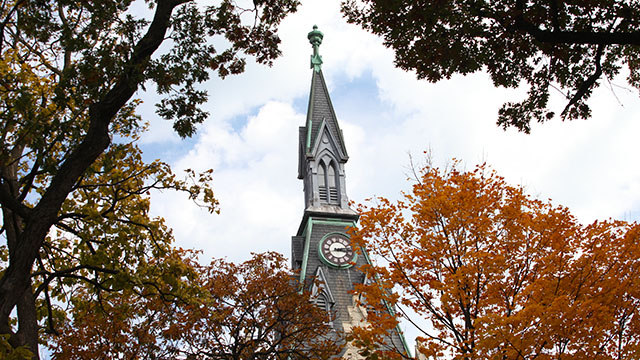Northwestern today published a comprehensive report outlining the roles of both the Department of Safety and Security and University Police in campus safety. It is part of a broader series of initiatives working toward racial and social justice.
The report establishes a shared set of information and data that is an important step toward improved transparency and dialogue, said Craig Johnson, senior vice president for business and finance.
“Northwestern has an explicit responsibility to protect the safety and well-being of all members of our community,” he said. “Together we can listen, reflect and reimagine how to foster campus safety and security in the most holistic and equitable way possible — informed by longstanding concerns of historical inequities in American policing.”
A second report about University Police (UP), prepared by external reviewers and containing recommendations, is underway and will be published this winter.
The report released today has several detailed sections on campus safety at Northwestern, including reported incidents, jurisdiction, UP staffing and training, officer demographics, UP partnerships and an extensive 11-year budget overview. Highlights include:
- UP responds to approximately 60,000 service calls per year, monitoring 1,500 emergency phones and 4,000 alarms. It offers escorts, supports events on campus and helps motorists with their cars, among other services. The department also provides community education on crime prevention and self-defense tactics and addresses matters raised by Evanston and Chicago neighbors.
- With a hybrid staff of highly trained police officers (55% of 67 total UP staff) complemented by unarmed civilian security officers (45%), UP can meet security needs with the appropriate response and resources.
- During moments of serious threat to campus safety, UP helps connect victims to additional resources and investigates the incident while alerting the community. The report includes examples to illustrate the scale and scope of UP’s responses to serious campus incidents.
- Transparency reports available online include quarterly data on field and traffic stops, presented by race and gender, for both the Evanston and Chicago campuses.
- UP staff receive training on topics such as unconscious bias, responses to individuals experiencing a crisis, de-escalation, CPR/AED and trauma care, as well as strengthening community trust and relationships.
- Half of UP police officers identify as Asian, Black or Hispanic, while one-third identify as women.
Overview of University Police budget
- UP is expected to account for 0.42% of the University’s $2.5 billion expense budget in fiscal year (FY) 2021.
- UP spending correlates to campus safety needs, for example when significant security incidents call for additional vigilance or in tandem with the opening of new buildings.
- Since FY 2011, UP expenditures have grown annually on average by 2.6% compared to 4.2% by Northwestern overall. However, since FY 2018, there has been a 7.6% decrease in UP spending as part of University-wide cost containment priorities.
- In FY 2020, expenses were $11.2 million, about 90% of which was for compensation and external contract staffing. Current fiscal year expenses are projected to be down by 5.2% to $10.6 million.
- The report further details 11 years of actual and projected expenditures by staffing category and type of spending, including costs specifically for police officers.
Engaging stakeholders across campus
Along with the release of this report and the external review to follow, there will be opportunities for members of the community to evaluate and reimagine what campus safety and security should look like.
Beginning Monday, Nov. 23, senior leaders will launch a new series of listening sessions called “Campus Conversations” that will stretch into Winter Quarter, covering a range of issues around safety, well-being and equity.
A new Community Safety Advisory Board, announced Nov. 13, will begin to consider the many dimensions of campus safety, embrace student voices and strengthen ties across the University. Dr. Clyde Yancy of the Feinberg School of Medicine will chair the advisory board with members representing students, faculty and staff.
“We acknowledge that change is needed, at Northwestern and around the nation, and that we do not have all the answers,” Johnson said. “Improving our community safety approach and restoring trust and legitimacy in our systems requires deep reflection, intentionality and commitment toward racial equity and justice.
“Change also must come from the process of listening to each other,” he said. “We reach out in the spirit of partnership, and we pledge to engage in this work with our faculty experts, our many committed staff members and our passionate students who all are deeply invested in Northwestern.”
